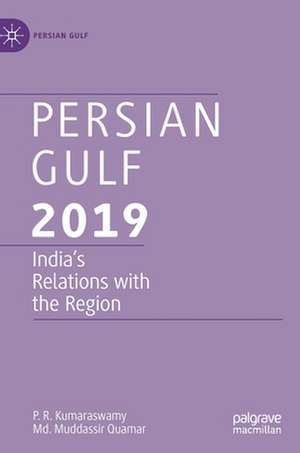Persian Gulf 2019: India’s Relations with the Region: Persian Gulf
Autor P. R. Kumaraswamy, Md. Muddassir Quamaren Limba Engleză Hardback – 9 feb 2020
Preț: 391.99 lei
Nou
Puncte Express: 588
Preț estimativ în valută:
75.01€ • 78.53$ • 62.21£
75.01€ • 78.53$ • 62.21£
Carte tipărită la comandă
Livrare economică 10-24 aprilie
Preluare comenzi: 021 569.72.76
Specificații
ISBN-13: 9789811514319
ISBN-10: 9811514313
Pagini: 283
Ilustrații: XVI, 283 p. 36 illus.
Dimensiuni: 148 x 210 x 26 mm
Greutate: 0.51 kg
Ediția:1st ed. 2020
Editura: Springer Nature Singapore
Colecția Palgrave Macmillan
Seria Persian Gulf
Locul publicării:Singapore, Singapore
ISBN-10: 9811514313
Pagini: 283
Ilustrații: XVI, 283 p. 36 illus.
Dimensiuni: 148 x 210 x 26 mm
Greutate: 0.51 kg
Ediția:1st ed. 2020
Editura: Springer Nature Singapore
Colecția Palgrave Macmillan
Seria Persian Gulf
Locul publicării:Singapore, Singapore
Cuprins
Chapter 1: Introduction.- Chapter 2: Bahrain.- Chapter 3: Iran.- Chapter 4: Iraq.- Chapter 5: Kuwait.- Chapter 6: Oman.- Chapter 7: Qatar.- Chapter 8: Saudi Arabia.- Chapter 9: United Arab Emirates.- Chapter 10: Yemen.- Chapter 11: Gulf Cooperation Council.- Chapter 12: Policy Options.
Notă biografică
P.R. Kumaraswamy is a professor of contemporary Middle East studies in Jawaharlal Nehru University (JNU), New Delhi, India. From 1992-1999, he was a research fellow at the Harry S., Truman Research Institute for the Advancement of Peace, Jerusalem. Since joining JNU in September 1999, he has been researching, teaching, and writing on various aspects of the contemporary Middle East. Prof. Kumaraswamy has edited a number of volumes and published research articles in a number of refereed and non-refereed international journals and regularly contributes to Indian as well as international media outlets. In February 2010, he set up the virtual Middle East Institute, New Delhi and serves as its honorary director. He is the editor of Contemporary Review of the Middle East and the series editor of Persian Gulf: India’s Relations with the Region.
Md. Muddassir Quamar is Associate Fellow in the Institute for Defence Studies & Analyses, New Delhi, India. He holds a Ph.D. in Middle East studies from Jawaharlal Nehru University (JNU), India. His doctoral thesis examined social developments in Saudi Arabia between 1991 and 2010 within a conceptual framework of Islamic modernism. Dr. Quamar’s areas of interest include Politics and Societies in the Gulf, Middle East Strategic Affairs, and Political Islam. His research papers have appeared in leading international journals such as Contemporary Arab Affairs, Digest of Middle East Studies, Journal of Arabian Studies and Journal of South Asian and Middle Eastern Studies. Dr. Quamar was a visiting fellow in King Faisal Center for Research and Islamic Studies, Riyadh and serves as Associate Editor of Contemporary Review of the Middle East.
Md. Muddassir Quamar is Associate Fellow in the Institute for Defence Studies & Analyses, New Delhi, India. He holds a Ph.D. in Middle East studies from Jawaharlal Nehru University (JNU), India. His doctoral thesis examined social developments in Saudi Arabia between 1991 and 2010 within a conceptual framework of Islamic modernism. Dr. Quamar’s areas of interest include Politics and Societies in the Gulf, Middle East Strategic Affairs, and Political Islam. His research papers have appeared in leading international journals such as Contemporary Arab Affairs, Digest of Middle East Studies, Journal of Arabian Studies and Journal of South Asian and Middle Eastern Studies. Dr. Quamar was a visiting fellow in King Faisal Center for Research and Islamic Studies, Riyadh and serves as Associate Editor of Contemporary Review of the Middle East.
Textul de pe ultima copertă
The book is seventh in the annual Persian Gulf series published by MEI@ND. It is a comprehensive analysis of India’s bilateral relations with the nine countries in the Persian Gulf and the GCC and focusses on developments during 2018. It gives a comprehensive account of the strategic, political, economic and cultural aspects of bilateral developments and also provides in-depth analysis of internal dynamics of the Persian Gulf countries. The final chapter offers policy recommendations based on the current state of affairs.
P. R. Kumaraswamy teaches contemporary Middle East in Jawaharlal Nehru University, New Delhi and is Honorary Director, Middle East Institute, New Delhi, India. In February 2010, he set up the virtual Middle East Institute, New Delhi and serves as its honorary director. He is the editor of Contemporary Review of the Middle East and the series editor of Persian Gulf: India’s Relations with the Region.Md. Muddassir Quamar is Associate Fellow, Institute for Defense Studies & Analyses, New Delhi, India. Dr. Quamar was a visiting fellow in King Faisal Center for Research and Islamic Studies, Riyadh and serves as Associate Editor of Contemporary Review of the Middle East.
Caracteristici
Places the bilateral relations within the context of internal and regional developments of these countries Offers rich data and statistics on the bilateral relations Makes informed policy recommendations for the Government of India







